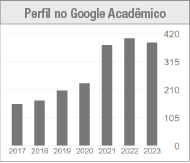Submissions
Submission Preparation Checklist
As part of the submission process, authors are required to check off their submission's compliance with all of the following items, and submissions may be returned to authors that do not adhere to these guidelines.- Yes, this work is original and unpublished, the content is not similar (plagiarism) to other published works.
- Yes, I agree with the Evaluation Policies this work is without authorship identification in the text and in the Word file, ensuring the Blind Evaluation by Peers
- Yes, I agree to reference and cite in this work at least one article published in postgraduate scientific journal
Continuous flow
It consists of original articles dealing with a theme different from the central theme of the edition. It is a space reserved for the publication of texts that deal with emerging issues and / or that are relevant to the field of Performing Arts. Articles received in a continuous flow, independent of thematic dossier.
Dossiê Temático: Estudos do reenactment nas artes da cena
Para este Dossiê Temático a Urdimento – Revista de Estudos em Artes Cênicas – receberá artigos até: 30 de junho de 2026. Estes artigos devem compor a Urdimento, v.2, n. 58, de agosto de 2026.
Debates
Esta seção recebe texto vinculado ao Dossiê Temático, em que vai ser publicado, resultante de mesas de debates. Essas mesas devem ser compostas por especialistas sobre o tema e que nela expõem seus conhecimentos sobre o assunto. Deve ter uma parte introdutória que situa essa mesa aos leitores da Urdimento. Deve ser uma publicação inédita.
Translations
Translations of foreign language texts into the Portuguese language will be accepted, duly accompanied by the authorization of the copyright holder of the original text
Interviews
It consists of interviews with renowned artists / researchers of the area and who contribute to the deepening and revision of established themes in the area of Performing Arts.
Reports
Vinculados ao Dossiê Temático enquanto assunto, essa seção pode publicar trabalhos de pessoas com prática artística, mas sem titulação acadêmica, mas com devido reconhecimento de sua atividade. Deve ser uma publicação inédita.
Entrevistas
Esta seção é composta de entrevistas com pesquisadoras(es)/artistas vinculados as artes cênicas. Sendo que a autoria se reparte entre a/o entrevistada(o) e a/o entrevistador(a). A entrevista deve ser precedida de um texto curto de apresentação da entrevistada, contextualizando sua temática e a situação em que foi realizada.
Review
This section is a review of works published in Brazil or abroad. Reviews should be accompanied by a cover image of the book and its bibliographic reference according to ABNT standards.
Dramaturgias
A seção Dramaturgias recebe texto scuja temática central esteja vinculada ao Dossiê Temático, em que vai ser publicado. A pertinência de sua publicação deve ser referendada pelos membros do Corpo Editorial do Dossiê Temático ao qual está vinculado. Deve ter uma parte introdutória que situa essa obra aos leitores da Urdimento. E deve ser uma publicação inédita.
Copyright Notice
Copyright Statement
The articles published by the magazine are free to use. The copyright is all assigned to the magazine. The articles whose authors are identified represent the expression from the point of view of their authors and not the official position of the journal Urdimento. The author (s) undertakes whenever publishing material relating to the article published in Revista Urdimento mention the said publication as follows: This article was originally published by Urdimento magazine in its volume (put the volume), number (put the number) in the year of (put the year) and can be accessed at:
http://www.revistas.udesc.br/index.php/urdimento
This work is licensed under a Creative Commons Attribution 4.0 International License.
Privacy Statement
The opinions expressed in articles are the sole responsibility of the authors. The publication of articles, photos and drawings have to be authorized by the responsible persons or their representatives. The names and addresses reported in this journal are not available for other purposes or to third parties.



